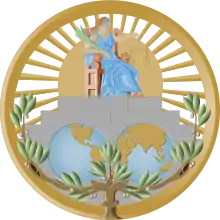Alleged Violations of the 1955 Treaty of Amity (Iran v. United States)
Alleged Violations of the 1955 Treaty of Amity, Economic Relations, and Consular Rights (Islamic Republic of Iran v. United States of America) is the formal name of a case in the International Court of Justice (ICJ). Iran filed a lawsuit with the Hague-based ICJ against the United States, on 16 July 2018, mainly[1] based on the 1955 Treaty of Amity signed between the two sides, well before the Islamic revolution of Iran.[2] Iranian officials said that US re-imposition of the nuclear sanctions was a violation of the treaty.[1] At the time, the United States regarded the lawsuit as "baseless" and vowed to fight against it.[2] Almost a month later, the case was heard by the ICJ within a week and the US was asked by the court's president to "respect the outcome."[3]
| Alleged Violations of the 1955 Treaty of Amity, Economic Relations, and Consular Rights (Islamic Republic of Iran v. United States of America) | |
|---|---|
 | |
| Court | International Court of Justice |
On 3 October 2018, the International Court of Justice, the United Nations' highest court, issued an interim order to the United States "to lift sanctions linked to humanitarian goods and civil aviation imposed against Iran."[4]
Background
Long before Iran's Islamic Revolution in 1979, Iran and the United States signed the Treaty of Amity which was meant to provide "a basis for friendly diplomatic exchanges and economic relations."[5]
US President Donald Trump pulled out of a 2015 accord between Iran and "major world powers" whereupon some of the sanctions against Iran were lifted in exchange for Tehran accepting some limitations on its nuclear program. The US government then announced "unilateral plans" to re-impose sanctions against Iran.[3] The Iranian government believed that the United States’ decision on 8 May 2018, to re-impose nuclear sanctions on Iran was a violation of the United States' international obligations, "especially articles 4, 7, 8, 9, 10" of JCPOA and the Treaty of Amity. Consequently, Iran filed a lawsuit with the International Court of Justice on 16 July 2018.[1]
Outcome of the lawsuit
About one month later, the ICJ heard the case[3] and on 3 October, the United States was finally "reprimanded" for re-imposing sanctions on Iran and was ordered "to lift restrictive measures linked to humanitarian trade, food, medicine and civil aviation."[6] "On humanitarian grounds, the US must remove by means of its choosing any impediment to the free exportation to Iran of goods involving humanitarian concerns," said the United Nations court's verdict on 3 October 2018.[4] Mohammad Javad Zarif, the Iranian Foreign Minister, hailed the ruling and described it as "a victory for the rule of law."[7]
Aftermath
Attempting to limit its vulnerability to rulings by the International Court of Justice, the US government stated that they were exiting the Treaty of Amity with Iran, which requires "giving one year's written notice" according to the treaty itself. The act was criticized by Mohammad Javad Zarif.[8]
References
- "Iran Files Suit against US for Violating 1955 Treaty of Amity - Tasnim News Agency". Tasnim News Agency. Retrieved 4 October 2018.
- Gladstone, Rick. "Iran Takes U.S. to Court Over Nuclear Deal and Reimposed Sanctions". Retrieved 4 October 2018.
- Berg, Stephanie van den. "World Court hears Iran lawsuit to have U.S. sanctions lifted". Reuters. Retrieved 4 October 2018.
- "UN court issues interim order to US to lift some Iran sanctions". www.aljazeera.com. Retrieved 4 October 2018.
- "UN court orders US to lift some Iran sanctions". SFGate. 3 October 2018. Retrieved 6 October 2018.
- Dehghan, Saeed Kamali; Borger, Julian (3 October 2018). "International court of justice orders US to lift new Iran sanctions". The Guardian. Retrieved 4 October 2018.
- "Iranian FM Hails ICJ's Ruling against US Sanctions - Tasnim News Agency". Tasnim News Agency. Retrieved 4 October 2018.
- "US pulls out of 1955 Iran treaty". CNN. 3 October 2018. Retrieved 4 October 2018.